Latest IoTeX News

9 days ago
IoTeX Launches Staking Program on DePINscan to Enhance User Participation in DePIN Ecosystems
On May 21, 2025, IoTeX, a prominent Layer 1 blockchain designed for decentralized physical infrastructure networks (DePIN), officially launched its Staking Program on DePINscan. This unified staking interface aims to empower users by providing a simplified and trusted gateway to support and earn from innovative DePIN ecosystems. The program initially offers native staking support for Hivello and Functionland, both of which are incubated by IoTeX, along with integrated staking for other projects like Filecoin, Fluence, Swan, and Aethir, in partnership with technical collaborator Parasail.
The launch of the staking program is a significant milestone as it aligns with the maturation of DePIN from a nascent concept to a fully developed industry. Qevan Guo, CTO and Co-Founder of IoTeX, emphasized that this initiative facilitates scalable user participation in real-world infrastructure projects. DePINscan is not merely a dashboard; it represents a gateway to the future of Web3 utility, providing visibility into over 100 projects and an ecosystem value exceeding $1 billion. With the introduction of native and cross-chain staking, token holders can now easily delegate to real-world networks, track rewards, and support aligned DePIN projects.
The integration of high-profile projects like Filecoin and Aethir highlights IoTeX's commitment to fostering open collaboration and chain-agnostic support. All staking operations are secured by Parasail’s robust infrastructure, ensuring reliability and scalability for future partners. Dom Carosa, co-founder of Hivello, expressed enthusiasm about the staking program, noting it as a significant opportunity for users to engage with decentralized infrastructure intuitively and rewarding. IoTeX plans to continue onboarding new projects and providing extensive support through marketing, infrastructure tools, and cross-chain integrations, inviting developers and builders to join their staking program.
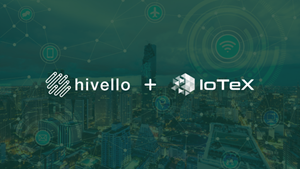
10 days ago
Hivello's $HVLO Token Listed on DePINscan, Enhancing DePIN Accessibility
Hivello, a decentralized physical infrastructure network (DePIN) aggregator, has announced the listing of its token $HVLO on DePINscan, a prominent analytics platform for DePINs on IoTeX. This strategic move is set to enhance Hivello's visibility within the DePIN and IoTeX ecosystems, allowing users to access information about Hivello and participate in staking directly on IoTeX's Layer 1 blockchain. With the DePIN market projected to grow significantly, this listing positions Hivello at the forefront of a rapidly evolving sector, catering to both crypto enthusiasts and newcomers interested in decentralized infrastructure.
The partnership with IoTeX is a pivotal development for Hivello, as it not only increases the accessibility of $HVLO but also provides users with essential tools and incentives to engage with decentralized networks. Domenic Carosa, Chairman of Hivello, emphasized the importance of this collaboration, stating that it aligns with their mission to onboard Web2 users into the Web3 space. The integration with DePINscan is expected to facilitate a smoother transition for users looking to explore and participate in the DePIN ecosystem, which boasts over 13 million active devices contributing daily.
As DePIN adoption accelerates globally, the collaboration between Hivello and IoTeX signifies a major step toward expanding participation in decentralized infrastructure. Qevan Guo, CTO and Co-Founder of IoTeX, highlighted that this launch represents a convergence of technical innovation and strategic partnerships, ultimately making DePIN more accessible to a broader audience. With the market anticipated to soar from $50 billion in 2024 to $3.5 trillion by 2028, Hivello is well-positioned to capitalize on this growth, fostering a new wave of participation in decentralized technologies.
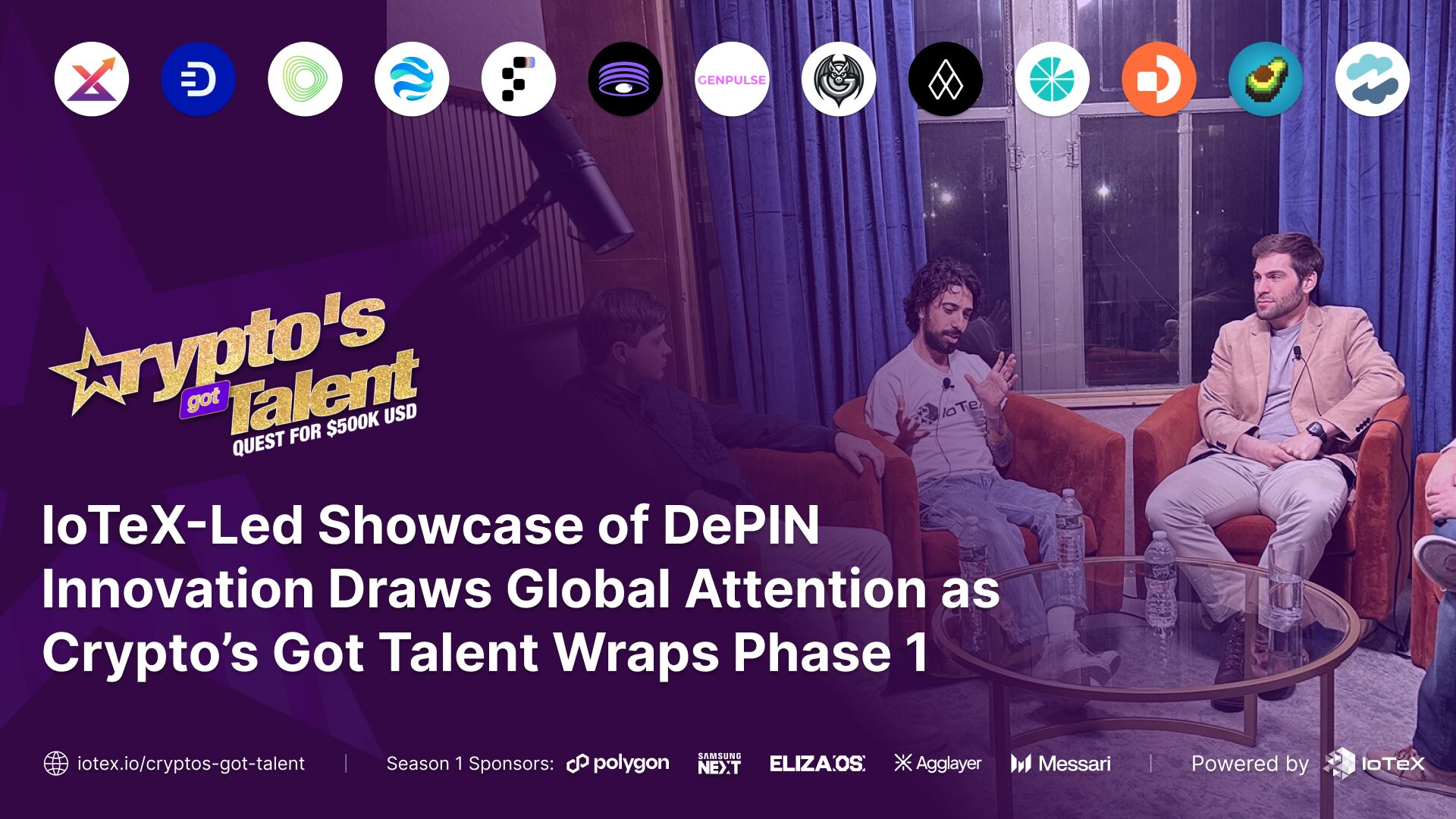
a month ago
Crypto’s Got Talent Concludes Phase 1, Showcasing DePIN Innovations
On April 30, 2025, Crypto’s Got Talent (CGT) concluded its first phase, showcasing a groundbreaking live talent show dedicated to the Decentralized Physical Infrastructure Networks (DePIN) movement. Powered by IoTeX in partnership with Polygon Labs and ElizaOS, CGT has redefined the traditional grant process by offering enhanced visibility, transparency, and community engagement. The event garnered significant attention, with over 190,000 impressions and 40,000 live views per episode, culminating in nearly 3,000 community votes. Eleven exceptional projects have progressed to Phase 2, where they will present detailed demos for a chance to secure a $500,000 grant.
CGT is not merely a talent show; it serves as a global launchpad for innovators and creators. Jing Sun, Co-Founder of IoTeX, emphasized the importance of this platform, stating that it connects real-world problems with innovative solutions. The semi-finalists, including Nubila, DeCharge, and JamGalaxy, were evaluated by prominent figures in the Web3 ecosystem, such as venture capitalists and DePIN experts. Giuseppe De Luca, Head of Developer Relations at IoTeX, highlighted the significance of developers in the Web3 landscape, noting that CGT provides them with a vital platform to transform their ideas into impactful movements.
As Phase 2 approaches, live-streamed demos and in-depth Q&A sessions will allow semifinalists to showcase their projects' market fit and deployment strategies. Evaluations will focus on technical feasibility and real-world adoption potential, with input from both community members and industry leaders. With support from notable organizations like Messari and Samsung Next, CGT is poised to become a premier stage for emerging DePIN startups, fostering innovation and collaboration in the blockchain space.
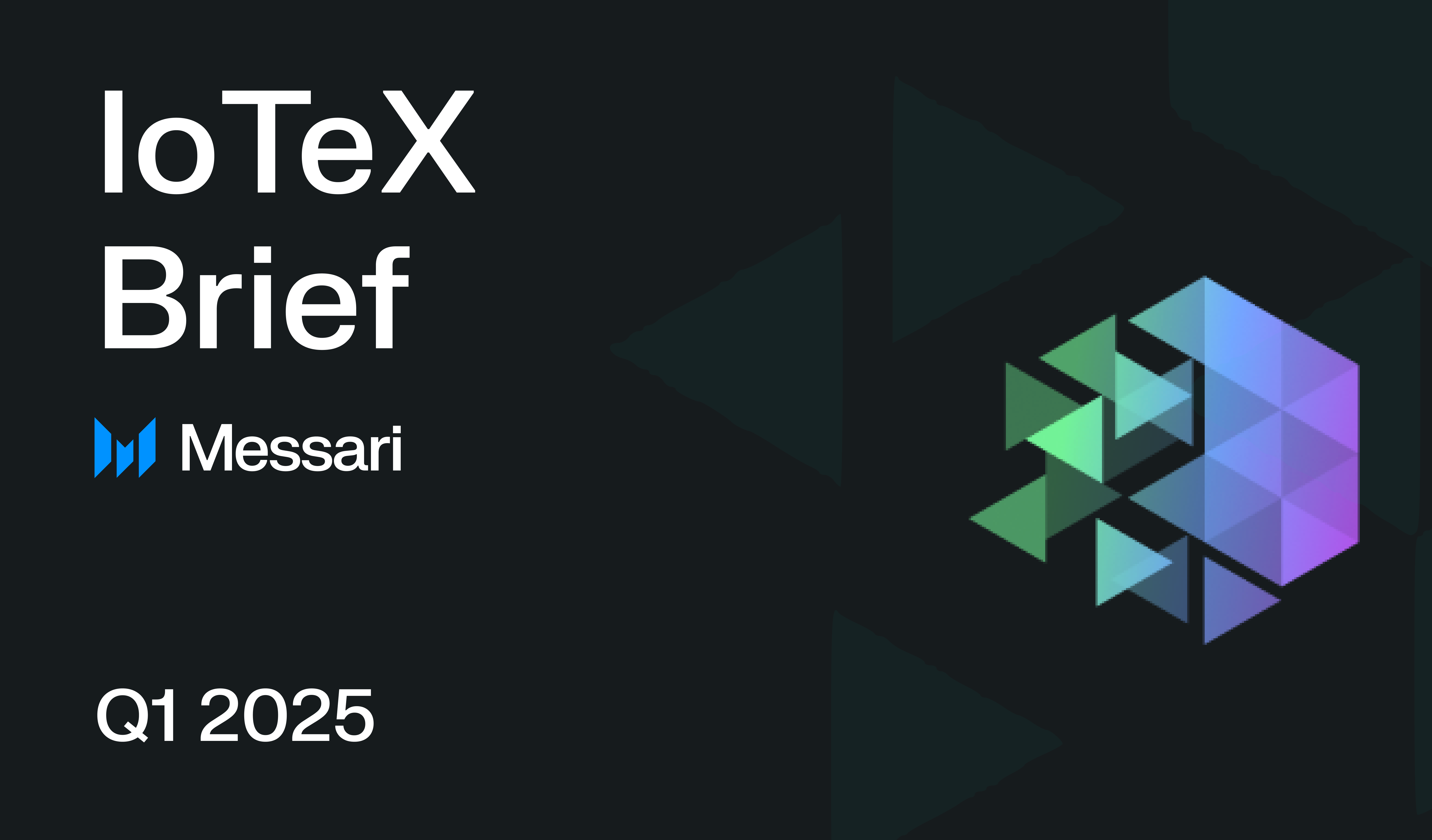
a month ago
IoTeX Launches Quicksilver and Expands DePIN Ecosystem in Q1 2025
In the first quarter of 2025, IoTeX made significant strides with the introduction of Quicksilver, a decentralized physical infrastructure network (DePIN) module that enables AI agents to interact with real-world data. This innovative framework aims to enhance the capabilities of AI by allowing it to process real-time data and respond adaptively to its environment. Partnerships with GEODNET and Nubila have been established to integrate their devices with the ioID module, facilitating machine verifiability and verified data uploads onto the IoTeX blockchain. Despite a decline in average daily active wallets and transactions, the network still shows impressive year-over-year growth, with active wallets up 850% and transactions up 2,250% compared to the previous year.
The IoTeX Network operates on a modular infrastructure that combines an EVM-compatible Layer-1 blockchain with off-chain computing capabilities. Users can stake the native token, IOTX, to vote for delegates responsible for securing the network and validating transactions. In Q1, the total fees on the network decreased by 55% quarter-over-quarter to $201,000, primarily due to significant drops in gas and decentralized exchange (DEX) fees. However, the network's staking activity remained robust, with 120 active delegates securing 3.8 billion IOTX, representing 40% of the circulating supply.
IoTeX's commitment to innovation is evident in its ongoing development of the Quicksilver framework, which integrates AI with decentralized networks. The introduction of BinoAI, an autonomous AI agent, further exemplifies this effort, as it shares insights about DePIN projects on social media. Additionally, the partnerships with GEODNET and Nubila highlight IoTeX's focus on verifiability and real-world data applications, paving the way for future collaborations aimed at enhancing the DePIN ecosystem. As IoTeX continues to evolve, its emphasis on integrating AI and decentralized technologies positions it as a leader in the blockchain space, driving demand for DePIN solutions.

a month ago
Navigating the Regulatory Landscape for DePIN in the U.S.
As the Decentralized Physical Infrastructure Networks (DePIN) sector gains traction in the cryptocurrency landscape, a critical question arises regarding its position within the U.S. regulatory framework. Current congressional legislation primarily addresses digital assets in a broad sense, encompassing stablecoins, tokens, and market infrastructure. However, the implications for DePIN are profound, as these policies will influence how DePIN projects secure funding, incentivize contributors, and deliver real-world services. Notably, legislation such as the STABLE Act and the GENIUS Act could significantly impact the stablecoin ecosystem that many DePIN projects rely on, potentially steering them towards more centralized options.
The FIT21 Act, which classifies tokens based on their decentralization and utility, is particularly relevant for DePIN. Tokens like $IOTX (IoTeX) serve as crucial infrastructure enablers, rewarding users and validating data. If classified as securities, these tokens could face stringent regulations that limit their exchange listings and user access. Additionally, the Digital Asset Market Structure Act introduces compliance requirements that may burden DePIN projects, especially those interacting with real-world payments. These developments highlight the urgent need for clarity in the regulatory landscape to foster innovation within the DePIN sector.
Advocacy efforts led by IoTeX and the Blockchain Association are pivotal in ensuring DePIN's recognition as legitimate infrastructure rather than mere financial speculation. Their recent engagement with congressional offices aims to educate lawmakers on the real-world applications of DePIN, emphasizing the need for supportive regulations. As the U.S. navigates this evolving landscape, it faces a choice: to lead in infrastructure innovation or risk losing it to other nations. With continued advocacy, DePIN can secure its place as a vital component of the national infrastructure narrative, paving the way for a decentralized future that benefits society as a whole.

2 months ago
IoTeX to Lead DePIN Education Day in Washington D.C.
IoTeX is poised to take a significant step in promoting Decentralized Physical Infrastructure Networks (DePIN) with its upcoming DePIN Education Day in Washington, D.C., scheduled for April 3rd. This event will see representatives from IoTeX collaborating with the Blockchain Association to engage with members of Congress. The primary goal is to showcase how DePIN integrates cryptocurrency into real-world applications and to emphasize its importance for the United States. The initiative aims to educate lawmakers on the potential benefits of decentralized infrastructure and its implications for the economy and society at large.
The IoTeX platform, known for its open-source blockchain tailored for the Internet of Things (IoT), is designed to tackle various challenges faced by existing IoT ecosystems. These challenges include security vulnerabilities, high maintenance costs, and scalability issues. By developing a unique blockchain architecture that supports a multitude of IoT devices, IoTeX aims to create a more secure and efficient environment for decentralized applications and IoT ecosystems. The innovative structure features a "blockchain within a blockchain" approach, where the main network manages security and operations, while sub-blockchains handle specific IoT devices and transactions.
At the heart of the IoTeX network is its native token, IOTX, which facilitates transaction fee payments and enables participation in network governance. This token plays a crucial role in the ecosystem, allowing users to engage in the platform's operations and contribute to its development. As IoTeX prepares for its educational outreach in Washington, the project continues to highlight the transformative potential of blockchain technology in enhancing the functionality and security of IoT networks.

2 months ago
Get Goated Season 2: Upcoming Token Rewards and Claim Process
The Get Goated Season 2 reward distribution is entering its next phase, following the successful $IOTX claim phase where millions of tokens were distributed to community participants. The claim window for $IOTX officially closed on March 27, with any unclaimed tokens reverting to the IoTeX Treasury Pool. The community will decide on the future use of these tokens through an IoTeX Improvement Proposal (IIP). As the program progresses, participants are reminded to claim their rewards before the deadline to avoid missing out on their allocations.
Starting April 7, 2025, participants can claim token rewards from the first batch of ecosystem sponsors, which includes Geodnet, Uprock, Drop Wireless, and Network3. Prior to claiming, there will be a review window from March 28 to March 31, where participants can verify their reward allocations. After this period, allocations will be locked into the distribution smart contract, and no changes can be made. This structured approach ensures that both social contributors and active participants are rewarded fairly, promoting engagement within the ecosystem.
A crucial element of this distribution is the zkPass verification, which played a significant role in the success of the first phase by ensuring that rewards were given to genuine users, preventing abuse from bots and fake accounts. This verification process will be integral to all future IoTeX campaigns, emphasizing the commitment to prioritize real users. The Get Goated Season 2 aims to celebrate and reward the IoTeX community, providing real ownership in the decentralized infrastructure of the future while encouraging ongoing participation and engagement.
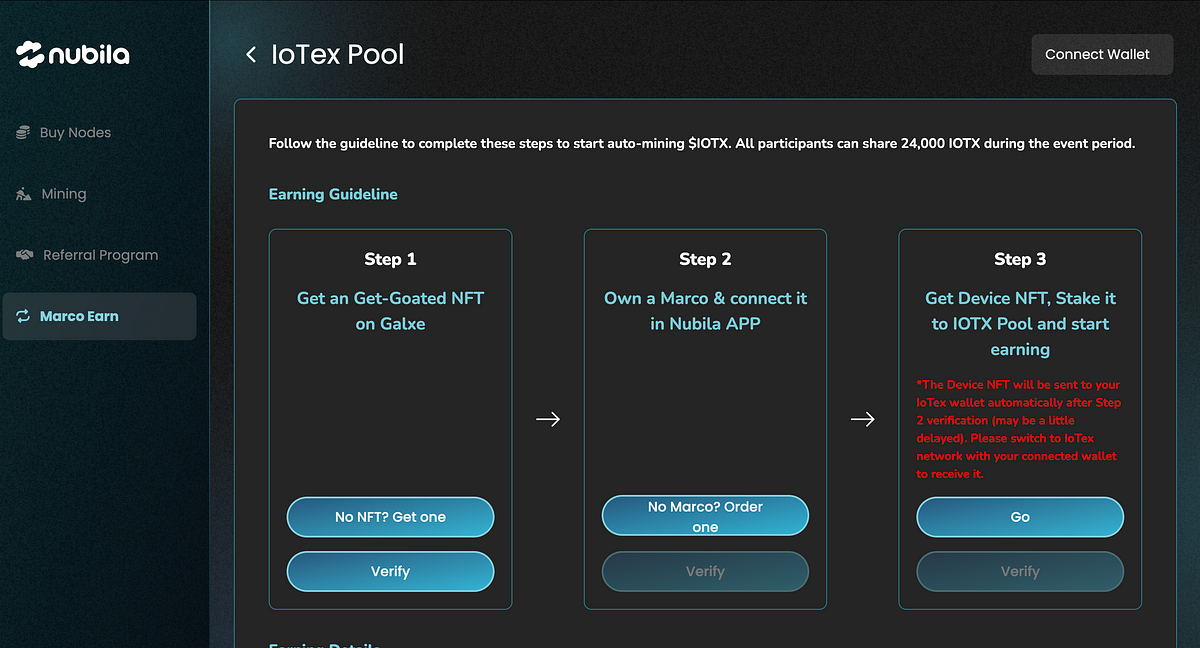
2 months ago
Nubila Launches Dual Mining Campaign for $IOTX with Marco Weather Stations
Nubila is at the forefront of a decentralized initiative aimed at collecting and rewarding real-time environmental data through its innovative Marco Weather Station, aligning with the broader DePIN movement. Participants in Nubila's Get Goated Season 2 campaign who own a Marco device can now engage in a Dual Mining Campaign. This program enables users to mine $IOTX, the native token of the IoTeX ecosystem, while also accumulating Nubila Mining Points, thereby incentivizing the collection of valuable environmental data.
To participate in the Dual Mining Campaign, users must meet specific eligibility requirements. Firstly, they need to own a Marco Weather Station and have it linked to the Nubila app, as the data collected from this device is essential for the mining process. Additionally, claiming the Nubila Get Goated Season 2 NFT, distributed via Galxe, is mandatory as it serves as an access pass for the dual mining activities. Once these prerequisites are fulfilled, participants can proceed to connect their wallets and verify their email addresses to confirm their ownership of the Marco device.
After verification, users can stake their Marco NFT in the IoTeX reward pool to activate dual mining. The process is designed to be user-friendly, with no gas fees required for transactions on the IoTeX interface. Nubila aims to create a decentralized environmental data network, utilizing AI to deliver accurate insights for industries sensitive to weather changes. This initiative not only promotes climate change awareness but also encourages sustainability through incentivized IoT devices, paving the way for a more informed and responsive approach to environmental challenges.
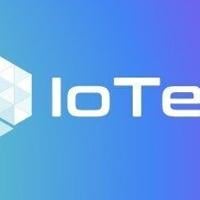
3 months ago
IoTeX Welcomes Xangle as Validator to Boost DePIN Ecosystem
IoTeX, a prominent player in the Decentralized Physical Infrastructure Network (DePIN) sector, has recently announced that Xangle, a leading blockchain infrastructure company from Korea, will join its network as a validator. This partnership is expected to enhance IoTeX's community-driven ecosystem and improve its technical stability. Xangle, known for its ecosystem-oriented community hubs and Web3 analytical reports, has been a significant contributor to the Web3 space since launching Xangle Portal in 2018, and has also validated for other major blockchain projects like Aptos and Babylon.
In 2024, IoTeX has emerged as a leader in the DePIN sector, processing over 150 million transactions and 340 million blocks, with an impressive annual growth rate exceeding 25%. Currently, more than 360 million IOTX tokens are staked, representing about 40% of the total supply, which significantly bolsters the network's security and governance. This growth underscores IoTeX's commitment to providing robust infrastructure solutions within the DePIN landscape, solidifying its position as a key player in the industry.
Lihan Lee, Co-CEO of Xangle, emphasized that their role as an IoTeX validator is a pivotal step towards making innovative Web3 infrastructures more accessible and promoting their mainstream adoption. Jing Sun, co-founder of IoTeX, echoed this sentiment, highlighting that Xangle's expertise will enhance the network's credibility and stability. Together, they aim to drive the sustainable growth of the DePIN ecosystem, ensuring that IoTeX remains at the forefront of blockchain infrastructure development.

3 months ago
ETHDenver 2025: A Turning Point for DePIN and AI in Crypto
ETHDenver 2025 showcased a vibrant mix of energy and innovation, particularly highlighting the advancements in Decentralized Physical Infrastructure Networks (DePIN) and artificial intelligence (AI). The IoTeX team, including Giuseppe De Luca, Aaron Basi, and Larry Pang, shared their insights during an X Space debrief, emphasizing the event's dual nature as both a celebration and a reality check for the crypto industry. While some projects demonstrated tangible progress, others appeared to be struggling to maintain relevance in an evolving landscape. The discussions at the event underscored the importance of real-world applications and sustainable business models moving forward.
A significant highlight from IoTeX's participation was the R3al World event, which focused on the intersection of DePIN and AI. Key announcements included the integration of GEODNET with ioID, which aims to enhance on-chain verifiable physical AI, and demonstrations of privacy-focused technologies like NovaNet's embedded zero-knowledge proofs on Raspberry Pi devices. The event also featured engaging fireside chats, including one between IoTeX's Larry Pang and industry experts, discussing the future of physical AI and the economic realities of DePIN. These conversations emphasized the necessity for decentralized networks to provide reliable, real-time data to support AI applications and the importance of creating viable economic models beyond mere token incentives.
The overarching theme of ETHDenver was a shift towards real-world utility and revenue generation within the DePIN space. IoTeX's Aaron Basi noted that the focus is now on projects that solve actual problems and generate revenue, moving away from speculative ventures. This evolution is evidenced by the rise of hyper-specialized networks and AI-driven insights that cater to specific market needs. While ETHDenver had its standout moments, it also revealed the industry's growing pains, including regulatory uncertainties and a lack of groundbreaking innovations. As the crypto landscape matures, the emphasis is clearly on creating practical applications that deliver real value to users and businesses alike.
Signup for latest DePIN news and updates